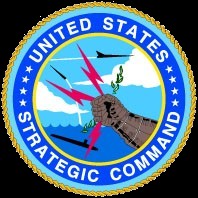|
United States Strategic Command
 U.S. Strategic
Command (STRATCOM) builds and maintains America's nuclear strike plans,
including the Single Operational Strategic Plan (SIOP), now called OPLAN 8044 (see
brief). As such the command has
a strong influence on the formulation of the U.S. nuclear policy and arms
control agenda. U.S. Strategic
Command (STRATCOM) builds and maintains America's nuclear strike plans,
including the Single Operational Strategic Plan (SIOP), now called OPLAN 8044 (see
brief). As such the command has
a strong influence on the formulation of the U.S. nuclear policy and arms
control agenda.
STRATCOM was
created in June 1992 in an attempt to provide a "single voice" of advice and
analysis to the President and Secretary of Defense on nuclear planning and
policy. The creation of STRATCOM brought overall responsibility for planning and
execution of Air Force and Navy nuclear plans "under one hat" with the services
continuing to operate and maintain the forces. At the same time a nuclear
"super-command" was created which has strong influence on U.S. nuclear policy
and the future evolution of the nuclear posture.
Beyond the
day-to-day maintenance of nuclear strike plan and target databases, STRATCOM's
force was its expertise in long-term analysis of deterrence and how the nuclear
posture related to arms control efforts. As such the command played a prominent
role in the START arms control agreements,
1994 Nuclear Posture Review, and most
recently the Bush administration's Nuclear Posture Review from 2001.
STRATCOM also
serves as the host to one of the most important and influential advisory groups,
the
Strategic Advisory Group (SAG), which provides direct advice to the
Commander in Chief of STRATCOM on a variety of issues ranging from certification
and reliability of individual warheads, deterrence policy, intelligence and
reconnaissance, and the industrial support of the posture. Access the following
groups of documents:
»
Global Strike
»
Nuclear
Forces Structure Studies
»
Strategic
Advisory Group (SAG)
|

